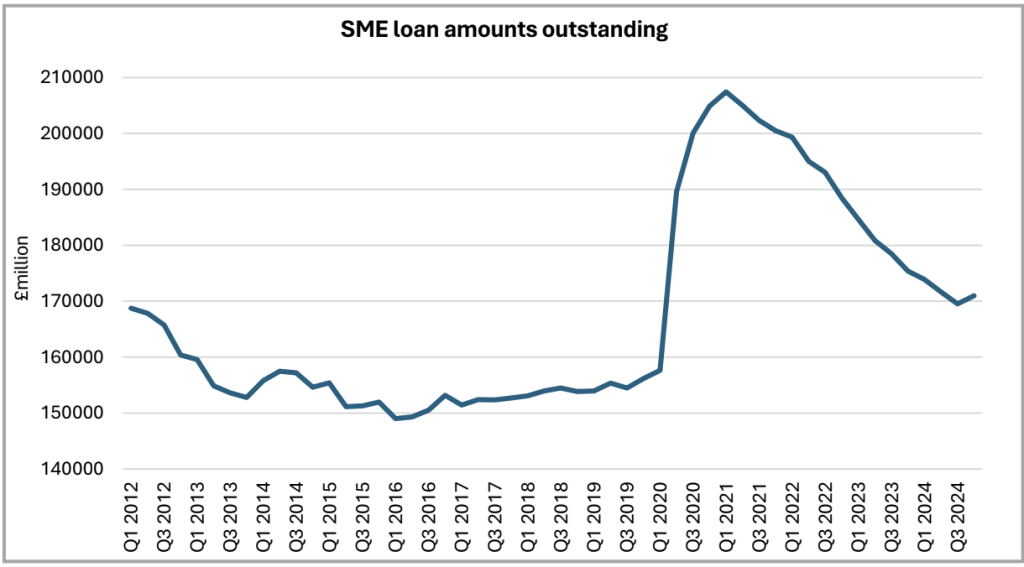Breaking News

SMEs Cut Debt by £4.4bn Across 2024, But Lending on Rise for First Time Since Pandemic
Analysis of the Bank of England’s data1in Ebury’s SME Borrowing Tracker shows that SMEs decreased their debt by £4.4 billion across 2024, reinforcing nearly three years of falling debt among SMEs, following the significant ‘debt pile’ accumulated during the pandemic.
However, the final three months of 2024 marked the first quarterly uptick in SME loans outstanding since the pandemic (Q4 2020), in a sign that perhaps SMEs are once again seeking out credit to invest and support their growth ambitions. It also points to improved confidence among lenders, with appetite for lending improving, particularly among challenger and specialist banks.
Between 31st December 2023 and 31st December 2024, SME debt fell by a net sum of £4.4 billion, from £175.4 billion to £171.9 billion. When compared to the total outstanding amount at the close of 2020 (£202.1 billion), current debt levels are now 17% or £33 billion fewer.
The borrowing boom triggered by the Covid-19 pandemic saw net loans of £47.3 billion accumulated in 2020 as businesses sought financial help to survive the unprecedented economic restrictions. With the Bank of England dramatically hiking interest rates in 2022, and in turn, surging the cost of borrowing, SMEs have been rushing to minimise their debt exposure.

The majority of SME lending during the pandemic was provided through the government-backed Coronavirus Business Interruption Loan Scheme (CBILS) schemes, of which Ebury was an accredited lender. The Government’s own figures2show that £25.9 billion was loaned out to around 100,000 firms under the CBILS scheme – under a third (30%) of CBILS facilities have been repaid.
That business support was launched amid a broader package of help including additional loans, the Bounce Back Loan Scheme, capital repayment holidays, extended overdrafts and asset-based finance.
Phil Monkhouse, UK Country Manager at Ebury, commented: “The Bank of England’s 50 basis points of rate cuts in 2024 have eased borrowing costs, giving SMEs some relief and renewed confidence that rates are moving in the right direction – encouraging many to access credit and re-invest in their businesses to accelerate their growth plans.
“But challenges remain. Many SMEs are still managing high debt repayments after years of rising costs and economic uncertainty, with many still repaying the significant debt accumulated during the pandemic. Unlike larger corporates, they have tighter margins and fewer buffers against shocks, making financial resilience critical.
“With Trump’s protectionist policies threatening operational costs and the UK’s own growth outlook on shaky ground, there could be more instability on the way. In this environment, SMEs must remain adaptable—ensuring they have nimble hedging strategies, seamless access to finance, and the right financial tools to protect against volatility and seize opportunities as they emerge.”
People In This Post
Companies In This Post
- YouLend and Intuit Team Up to Bring Embedded Capital to QuickBooks UK Customers Read more
- dLocal and Amway Partner to Strengthen Local Payments For Direct Selling Across Latin America Read more
- How Freedom Holding Corp Turned Technology Foundations into a Scalable Fintech Ecosystem | Freedom Holding Corp | The Fintech Show #161 Read more
- ComplyAdvantage Fintea Chats: Fighting Financial Crime in an Age of Faster, Smarter Criminals Read more
- ING: Why “Autonomous AI” Is Misunderstood Read more


















